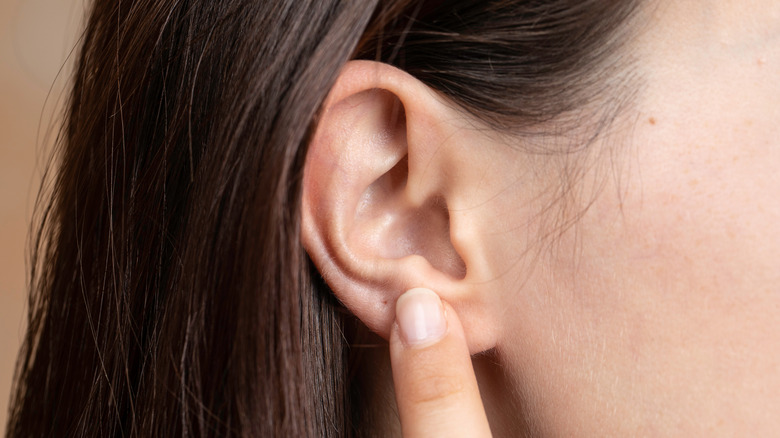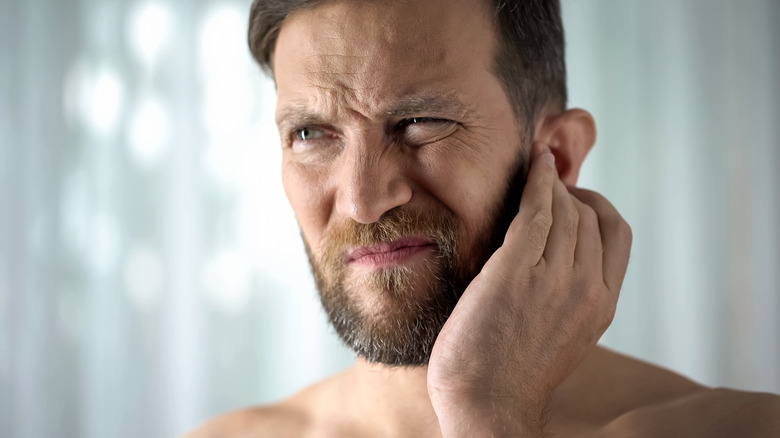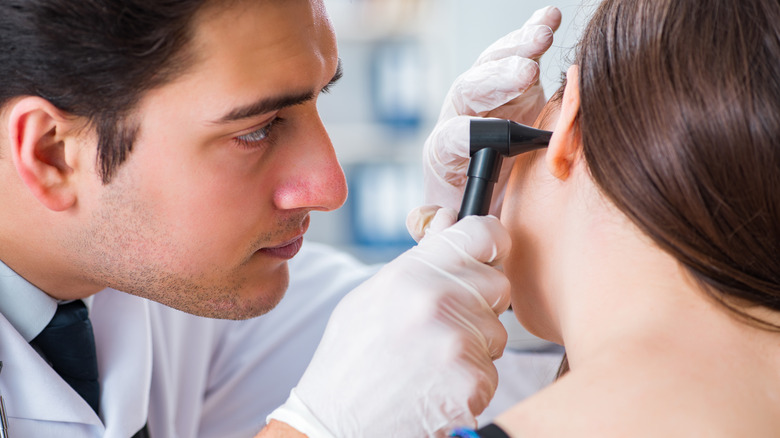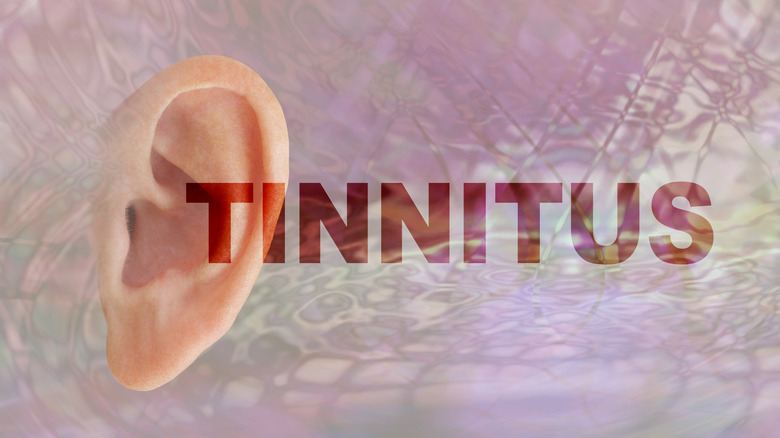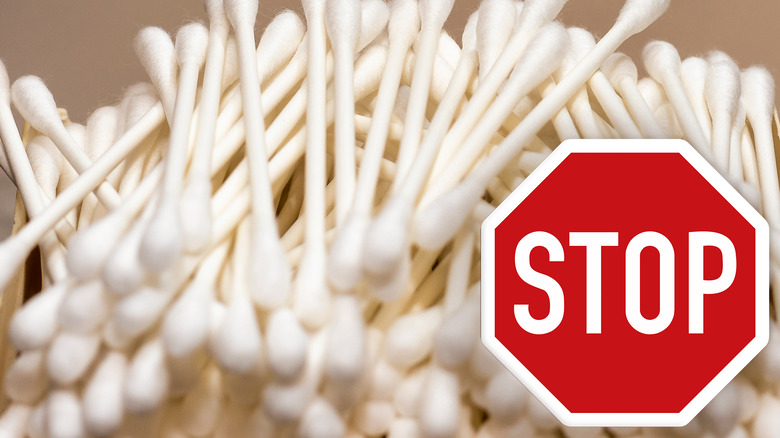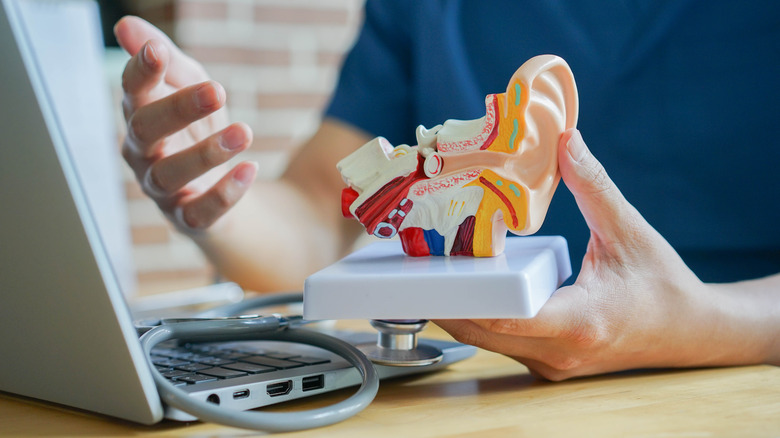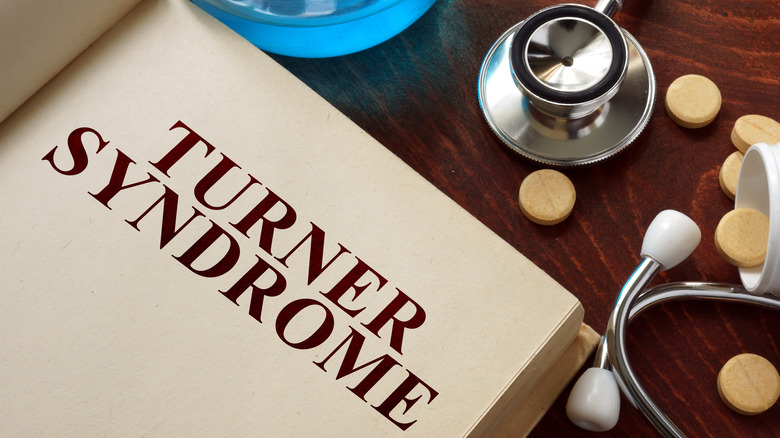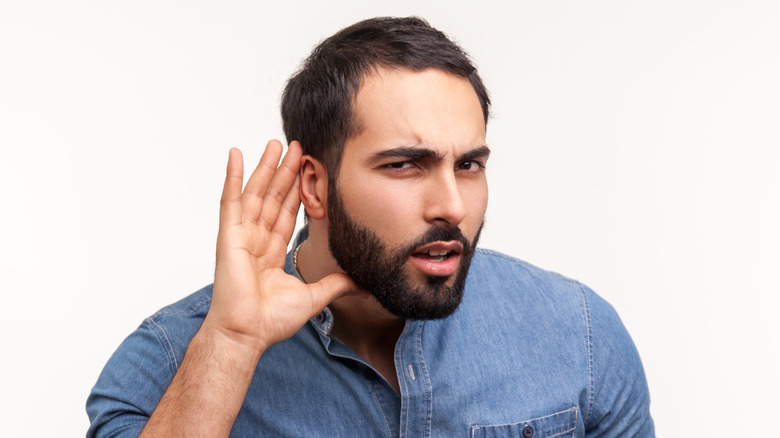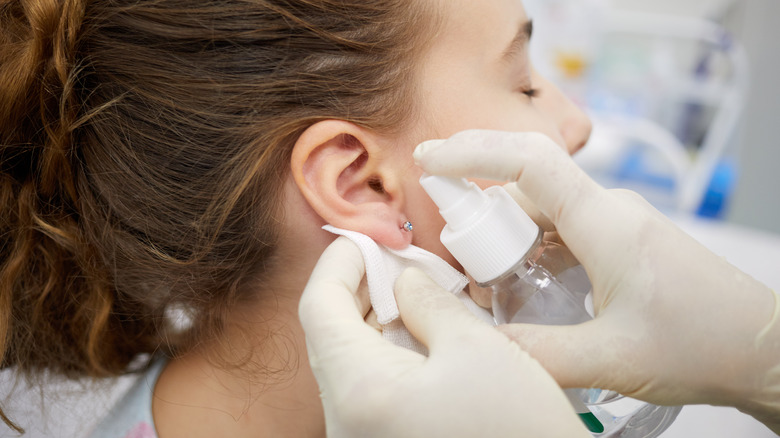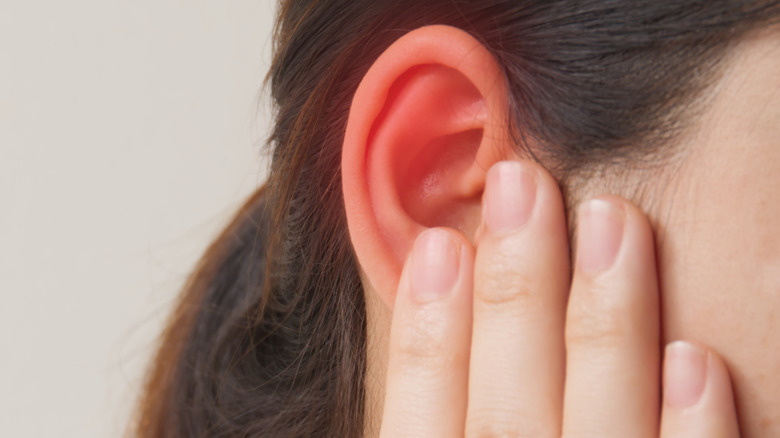Surprising Things Your Ears Can Reveal About Your Health
In William Shakespeare's play "Julius Caesar," Mark Antony says the famous phrase, "Friends, Romans, countrymen, lend me your ears." In other words, he was asking the crowd to listen to him because he had something important to tell them. But, your ears can not only take in crucial information, but also warn you when something is wrong. Understanding what they're trying to tell you, however, can be difficult.
For example, if you have an earache, your first thought may be that you have an ear infection. But not so fast. As WebMD explains, pain in your ears could be something less severe, such as having too much earwax. It also could signal a problem that has nothing to do with your ears or your hearing, such as dental issues or an infection in your throat. Of course, you should still take an earache seriously, especially if it lingers for a couple of days and is accompanied by other symptoms like vomiting or a fever. With so many possible causes, trying to self-diagnose your pain could actually create more problems for you.
What your ears can reveal about your health goes well beyond just discomfort. Sometimes, just the way they look — maybe how they've always looked — can hold important clues about both present and future wellness concerns. So, to borrow a page from the Bard, it's time to figuratively lend us your ears as we explore signs and symptoms that you should never ignore.
Itchy ears could mean psoriasis
We've all heard the phrase, "your ears must have been burning" when someone was just talking about you. But, what about when they're itching? Obviously, there could be a very simple explanation, such as you may need to switch shampoos. However, according to Healthline, if you also notice cracked, bleeding skin on your outer ear or ears that stubbornly refuses to heal, you could have a form a psoriasis.
Remember, it's natural for our skin cells to die and, normally when this happens, we just shed those cells and barely notice. That is, unless you have psoriasis. This autoimmune disease causes our skin to age very quickly (via Healthline). As a result, we suddenly have a large amount of dead, scaly, rough skin. And when this happens on your ears, it can actually cause hearing loss. How? Well, it's not a pleasant thought but all that extra dead skin can combine with your earwax, creating natural earplugs.
While psoriasis is not curable, you can treat it (via Healthline). A doctor can remove the excess skin and wax, allowing you to hear again. They also may be able to prescribe steroids and topical medications to help you with your condition. While more research is needed on natural remedies for psoriasis, there is evidence that jojoba oil and olive oil can help soothe your itchy skin. However, do not put anything inside of your ear canal (including oils and medication) unless your doctor advises you otherwise.
Your ear wax's color could indicate an infection
In the movie "Shrek," the gruff ogre pulls a long column of green earwax from his horn-like ear to make a candle. But Shrek should have taken a good look at the color of his lifehack candle before he lit it because green is a definite warning sign when it comes your ears' waxy build up.
As Medical News Today explains, when a person's earwax is off white, yellow, orange, or brown, that's usually a positive sign that they're healthy. However, green earwax that has a strong, unpleasant scent can be a symptom of a bad ear infection (although, in Shrek's case, it's probably just because he's a green ogre). And buckle up, because the symptoms only get more disgusting from here. Earwax that's a combination of yellow and green can mean pus is draining from your ear. If you're wax is gray, then you might have too much dust in your ears. Wax that's black in color could mean you have a great deal of wax buildup in your ears, which can impact your hearing.
In addition, watch for any signs of blood in your earwax. Dry blood could mean you have a bug bite or a scratch inside your ear canal (via Medical News Today). Wet, runny blood, however, could mean your eardrum has been damaged.
What if you have no ear wax?
While earwax can be a nuisance, it's a necessary one. As Medical News Today explains, that sometimes-annoying wax is like a sticky shield that protects both your ear canal and your eardrum. So, the last thing you want is for it to disappear entirely. Unfortunately, that's exactly what happens if you have keratosis obturans (via Carson Hearing Care).
Also known as KO (via Medline Plus), this rare condition is when keratin builds up inside your ear canal, creating a hard plug. Remember, although keratin is a protein found in your skin, this is different than psoriasis where dead skin cells accumulate inside your ear. In fact, this condition may be connected to how your body produces new skin cells specifically inside your ear canal. Regardless, KO can cause issues with your hearing, as well as inflammation and pain inside your ears.
Fortunately, KO is very treatable if you have a medical professional remove the keratin plug and apply medication to your ear canal (via Medline Plus). While this may sound like a simple fix, do not attempt to do this to yourself or someone else. Putting something inside a person's ear can rupture their eardrum. Also, you may need to periodically have a doctor remove the keratin plug if you have the chronic version of this condition (via Carson Hearing Care).
Don't ignore that ringing in your ears
A common trope in movies and TV shows is to have a character experience ringing in their ears right after a nearby explosion knocks them off their feet. Well, this is one of those times when Hollywood is being very true to life. Loud noises, like the music at a concert or party, can make your ears ring because of a condition called tinnitus (via Cedars Sinai). And, if you think a pair of earplugs is all you need to avoid this possible issue, think again.
As Cedars Sinai's website explains, a number of health issues can cause tinnitus, including thyroid problems, allergies, blood pressure irregularities, diabetes, a misaligned jaw, problems with the tiny bones or nerves in your ears, and injuries to your neck or head. In addition, that ringing, buzzing, or even roaring in your ears could be a side effect of a medication you're taking or simply a part of aging. It can even indicate that you might have a tumor.
While the severity of tinnitus varies, it can be disabling and interfere with getting a good night's sleep, according to Cedars Sinai. Fortunately, there are devices that can help, including hearing aids, cochlear implants, and maskers that can soften the ringing caused by tinnitus. Medication, as well as therapy, may also be options for managing this condition.
What if your ears bleed?
It's easy to dismiss blood in the ears as it could never happen to you. After all, you don't put anything inside your ear that could cut or damage it. You don't go sticking your finger in your ear. Sure, a little bug may sneak inside your ear canal and bite you, but that's more of a fluke than an everyday occurrence. Even though this is all very good ear-care behavior, it doesn't guarantee your ears won't bleed.
First, let's clear up a little misconception: Although many people use cotton swabs to clean their ears, they can make your ears bleed. As the Cleveland Clinic's website explains, using them too forcefully, even if you're nowhere near your eardrum, can do enough damage to the walls of your ear canal to draw blood. And, if you insert them too far inside your ear canal, you could rupture your eardrum, which can take eight to 10 weeks to heal naturally. But, what if it doesn't heal? Then you'll need a type of surgery called a tympanoplasty to avoid permanent hearing loss. Bottomline: Despite their convenience, you should not use cotton swabs to clean your ears.
Besides something entering your ear canal, your ears can bleed because of an ear infection or because of trauma to the head (via Cleveland Clinic). And, although it's rare, blood in your ears can be a warning sign that you have a form of ear cancer.
Pus in your ear can mean a ruptured eardrum
Let's face it. Pus is not a pleasant topic (to put it mildly). It's disgusting and usually a bad sign that something is wrong. But, sometimes, the only way to avoid health problems is to explore the unpleasant.
According to the Cleveland Clinic's website, pus in the ear can be a sign of two major problems: an middle ear infection and a ruptured eardrum. Remember, the eardrum is the membrane between your ear canal and your middle ear. If you have an infection in your middle ear, then you may start to develop pus, which can begin pushing against your eardrum. Just like a dam giving way to rising water, eventually the pus could break a hole through your eardrum and leak into your ear canal.
Fortunately, your ear drum can heal on its own or be surgically repaired, although it is possible (albeit rare) that a person could experience long-term hearing loss because of a damaged eardrum (via Cleveland Clinic's website). Other rare but possible complications include ongoing dizziness and vertigo, and the eardrum itself becoming infected. Speaking of infections, you do not want to leave a middle ear infection alone and hope for the best. So, if you're seeing pus in your ear, get yourself to your health care professional right away.
Low-set ears can be a sign of Turner syndrome
Before we begin, it's important to note that there are a number of reasons why someone may have low-set ears (via WebMD). With that said, one possibility is a chromosomal disorder called Turner syndrome (via Medical News Today). And, as its name implies, this syndrome has to do with a person's DNA.
As Medical News Today explains, the cells in the human body contain strands of DNA called chromosomes. Female humans have two sex chromosomes. A female human with Turner syndrome, however, either has only one sex chromosome or has abnormalities in the X chromosome in some of her cells. As a result, she may have certain traits as early as birth like low-set ears, prominent earlobes, a broad chest, swollen feet and hands, eyelids that droop, upward-turning fingernails, a wide neck with extra skin, and a receding lower jaw.
Unfortunately, Turner syndrome can put someone at higher risk for a variety of health problems like osteoporosis, scoliosis, and diabetes, as well as issues with their eyes, kidneys, and thyroid (via Medical News Today). In addition, young girls with Turner syndrome are more likely to have a type of ear infection called otitis media or glue ear, which can lead to hearing problems later in life. Plus, they may develop depression, anxiety, and attention hyperactivity disorder, or ADHD.
What can cause hearing loss in just one ear?
Okay, full disclosure. There are simple reasons why you may experience hearing loss in only one of your ears. For example, you may have too much earwax in either your left or your right ear. However, hearing issues involving only one ear can also be the result of a rare type of brain tumor (via Harvard Health).
According to Harvard Health, these noncancerous, slow-growing tumors go by two names: acoustic neuroma and vestibular schwannoma. Whichever one you prefer, they can impact both your balance and your hearing, resulting in hearing loss and tinnitus (a.k.a. ringing in your ear). So, the bigger the tumor, the worse your symptoms? Not quite. Actually, the size of the tumor isn't connected to the severity of a person's symptoms. In fact, it's possible to have a large acoustic neuroma and yet have only minor side effects.
So, what can you do if you suspect you have an acoustic neuroma? Well, as Harvard Health explains, there are several treatments available, including microsurgery and radiation therapy. Or, a doctor just may want to monitor the tumor via MRIs to track its growth. Which method you and your doctor decide on is influenced by a number of factors like the size of tumor, how severely it's impacting your hearing, and your age. However, even with treatments, it may only be possible to keep your hearing from becoming worse rather than regain the hearing that you've already lost.
Creased earlobes could mean higher risk for heart disease
This might sound like another health myth. After all, how could something like a tiny line in your ear lobe really predict the likelihood of having heart issues? But there has been enough scientific evidence over the years to put this one in the solidly plausible category.
Dr. Sanders T. Frank drew the possible connection between diagonal earlobe crease, or ELC, and coronary artery disease in a letter to the New England Journal of Medicine (via Healthline). And, while some studies' findings seem to disprove Dr. Frank's theory, ELC, or "Frank's sign," could offer insight into a person's future health. How? Well, one theory suggests that the reason some people have a crease on their earlobes is because the small blood vessels in their ears are degenerating. If this is the cause, then larger blood vessels, particularly those around the heart, could also be deteriorating, which would make the person more likely to have heart issues.
How telltale is "Frank's sign?" Well, researchers from a 1989 study involving 300 deceased individuals said, "We found a strong association between earlobe creases and a cardiovascular cause of death in men and women after age, height, and diabetes had been controlled (via Healthline)." So, is having a crease on your earlobe a guarantee that you could have heart issues? No, but you may want to talk with your health care professional about your level of risk.
Pits around the ear could be symptoms of Beckwith Wiedemann syndrome
The human ear has a very unique shape comprised of dips and folds that help us collect sounds. But, if a person's outer ears have pits and creases, it could be a sign of a condition called Beckwith Wiedemann syndrome, or BWS (via Medical News Today). And while this syndrome can have a wide variety of side effects, none of them should be ignored.
As Medical News Today explains, BWS begins when a person is still developing in their mother's womb. Since it impacts chromosomes connected to how a person grows, the results can be a baby or a child experiencing growth spurts in certain parts of their body. For example, they could have proportionally larger tongues, livers, and kidneys, as well as one side of their body growing at a faster rate than the other side. Or, they also could have an overall larger body size. Besides these growth spurts, someone with BWS may have red or pink birthmarks on their face, blood sugar issues, and a cleft palate.
While the accelerated growth associated with BWS usually stops around age 8, people with this condition are more likely to develop certain types of rare tumors. So, it's important to monitor BWS even if someone is only experiencing mild symptoms. In addition, some of the effects of BWS can be addressed with surgery.
What can cause numbness in your ears?
Get ready because, as Healthline points out, there are quite a few reasons why your ears can feel numb. Some — like having too much earwax, an ear infection, or something in your ear (like a cotton swab) — are pretty straightforward and easy to guess. But get ready for a shock. Getting your ears pierced can also make your ears feel numb.
Yes, you read that right. Something incredibly common that you can have done at the mall could lead to ear numbness (via Healthline). Why? Because that needle can actually damage the sensory nerves in your ear. Suddenly, Sandy's reluctance to have her ears pierced during the slumber party scene of "Grease" doesn't seem so unreasonable, after all. Similarly, a direct blow to your head/ears can have the same effect. The list doesn't stop there. Besides sensory nerve damage, numbness in the ears can be a sign of having a stroke. So, if it's accompanied by facial drooping, arm weakness, or problems speaking, it's time to call 9-1-1.
In addition, if you are diabetic and don't manage your condition, you could experience ear numbness, as well as tingling in your face (via Healthline). And swimmers beware, if your ear feels numb, it could be because you have water containing fungus or bacteria in your ear. Known as swimmer's ear, this infection can lead to pain and hearing loss.
What is red ear syndrome?
Feeling like your ears are hot when you're embarrassed is nothing unusual, but randomly feeling like your ears are burning for at least half an hour could be a sign of red ear syndrome (via WebMD). Although this is a very rare condition and, so, a great deal is still not known about it, we have learned that there are two versions of this syndrome that are linked to specific medical issues.
According to WebMD, the most common form of this condition is primary red ear syndrome, which usually affects children, teens and young adults who have migraines. Secondary red ear syndrome is usually found in women and older adults with spinal issues, cluster headaches, and jaw pain caused by a disorder of your temporomandibular joint (or TMJD). Regardless of which version someone has, that burning sensation in their ears can range from dull to sharp and can spread to other parts of their face like their cheeks.
Unfortunately, the symptoms of red ear syndrome can last for more than four hours (albeit this is not common), and attacks can happen as often as 20 times a day (via WebMD). While there are medications that can treat this syndrome, being aware of possible triggers (like teeth grinding, chewing, and exercising) is also an important way to manage symptoms.
Never just dismiss crackling sounds in your ears
If you've ever had a cold or a sinus infection and noticed crackling in your ears, don't worry. That is very common since such medical issues can affect the tubes that manage the fluid and pressure levels for your middle and inner ears (via WebMD). Allergies and even earwax can also cause that crackling, popping sound. But, like many health symptoms, there are more troubling reasons if you're hearing a crackle for no apparent reason.
Besides sinus infections, you might hear crackling sounds in your ears because of a type of middle ear infection called acute otitis media (via WebMD). Symptoms can include fever, headaches, hearing issues, and pain and pressure in your ears, as well as fluid leaking out of your ears. Also, polyps or tumors that develop in your nose can block the tubes that keep the pressure and fluid in your ears at steady levels. Neither are pleasant thoughts, but there are still other reasons why you might be hearing crackling.
That crackling sound can be a sign of a form of tinnitus, called middle ear myoclonus, or MEM. Although we don't think about it, our ears have muscles, which can spasm. When this happens, your eardrum vibrates, resulting in crackling and clicking. Speaking of clicking, that persistent noise might be coming from your jaw since it's right by your ears. This is especially the case if you have a disorder of your temporomandibular joint (TMJ).
Ears that feel stuffy could be ear barotrauma
Have you ever been on an airplane and heard a baby begin crying but not because they were hungry, tired, or needed their diaper changed? If you've had this experience, then you witnessed a common example of ear barotrauma. In fact, as WebMD reports, this condition has been dubbed "airplane ear."
When there is a sudden change in air pressure (like on an airplane), your middle ear is affected, which can cause pain and a general feeling of stuffiness inside your ears. Babies are particularly sensitive to fluctuations in air pressure, which is why they sometimes cry on airplanes. However, it's possible to get ear barotrauma from non-flying activities like using an elevator. In fact, scuba divers refer to this condition as "ear squeeze" since increases in water pressure can also change the pressure inside your ears.
Despite the word "trauma" being in its name, ear barotrauma is usually not serious as long the air pressure in your ears returns to normal relatively quickly (via WebMD). You'll know when this happens because you'll hear a pop, and suddenly your ears will feel less clogged. But, if pressure in your ears does not return to normal fast enough, you could experience vertigo, severe pain in your ears, and hearing loss. If you see blood in your ears, then you could be looking at a damaged eardrum.

